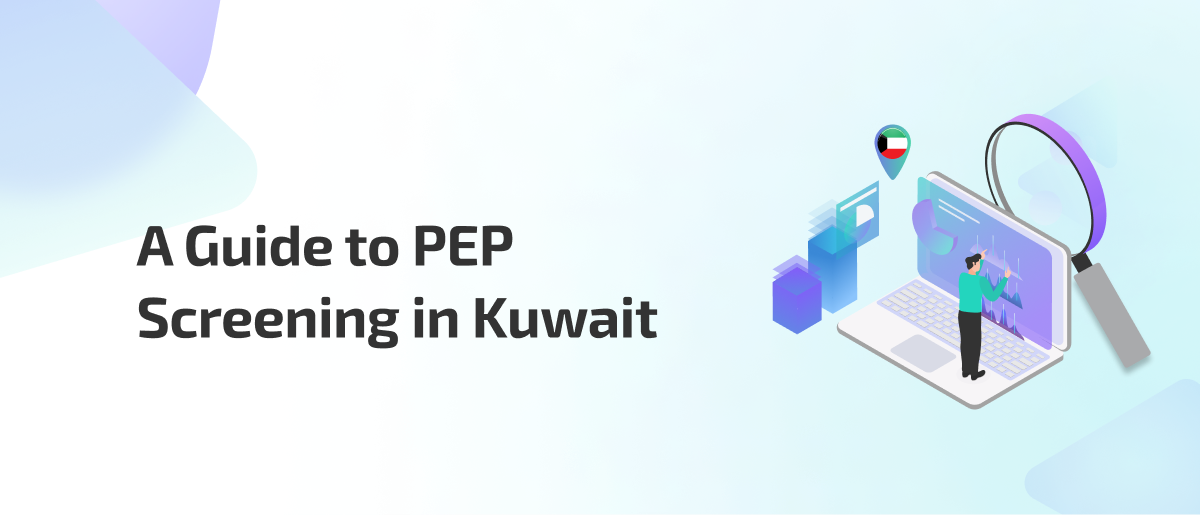PEP Screening in Kuwait: Regulations, Risks, and Best Practices

Accelerate AML Compliance: Meet Regulatory Demands with 80% Less Setup Time
Politically Exposed Persons (PEPs) represent a unique and high-risk category because these individuals, by virtue of their roles in government or international organizations, often have access to state resources, contracts, or influence that can be abused for illicit gain.
Kuwaiti banks and financial institutions face heightened scrutiny from both local and international regulators. A failure to properly screen, monitor, and manage PEP relationships can expose institutions to serious consequences.
Politically Exposed Persons (PEPs) in Kuwait
Most definitions of a Politically Exposed Person (PEP) center around titles, that is; presidents, ministers, judges, generals. But this title-based view misses a deeper truth: being a PEP is less about the role and more about the risk that follows proximity to state power.
A more accurate way to understand PEPs is to treat them as nodes in a network where influence and vulnerability intersect. Their position gives them access to decision-making and resource allocation, which makes them natural targets for corruption, coercion, and criminal facilitation.
What makes this status risky isn’t that every PEP is corrupt, far from it. It’s that even the appearance of impropriety can undermine public trust, enable illicit finance, or create blind spots in compliance systems. That’s why international frameworks like those from the Financial Action Task Force (FATF) define PEPs not only by who they are but by who’s close to them, immediate family members and known associates, because influence often moves through informal, undocumented channels.
This extended definition makes the PEP classification unique in compliance. It isn’t strictly based on behavior (like a criminal conviction) or financial activity (like transaction volume). It’s based on potential exposure, to bribes, to favoritism, to the risk of being used as a conduit.
What's Often Missed in Public Discourse
- PEP status isn't always public. Many countries don't publish centralized databases of PEPs. Financial institutions are left to rely on fragmented sources, commercial databases, and media reports, creating inconsistencies in enforcement.
- PEP status is temporary but vague. FATF recommends treating individuals as PEPs for a period of time after leaving office, but this duration isn’t standardized. Some institutions use 12 months, others 5 years. That ambiguity creates regulatory grey areas.
- PEPs are not inherently bad actors. Being a PEP is a compliance classification, not a judgment. But politically, the term often carries stigma, which is why many avoid using it openly in public sector discussions, even though it's central to AML/CFT systems.
- Low-income countries face higher PEP-related risks. In fragile states, where oversight is weaker and institutions less independent, PEPs may wield disproportionate influence over contracts, licensing, and appointments. This makes the global monitoring of PEPs not just a financial issue, but a governance one.
Global Vs. Local Definition
International standards, particularly from the Financial Action Task Force (FATF), define PEPs in three broad categories:
- Foreign PEPs: Officials of a foreign government or international organization
- Domestic PEPs: Individuals with political or executive roles within the country (e.g., Kuwait)
- International Organization PEPs: Senior officials in global entities (e.g., UN, OPEC)
In Kuwait, the Central Bank of Kuwait (CBK) and the Kuwait Financial Intelligence Unit (KwFIU) follow these same categories.
Under Law No. 106 of 2013 on Anti-Money Laundering and CBK Instructions for Combating Money Laundering, banks and financial institutions must identify, risk-classify, and apply enhanced due diligence (EDD) to all PEP relationships.
Who Else Is Considered a PEP?
Kuwaiti regulations and FATF guidelines require institutions to go beyond the individual PEP and assess:
- Immediate family members: Spouse, children, parents, siblings
- Close associates: Anyone known to have a joint beneficial interest or business relationship with the PEP
For example, a PEP’s brother who co-owns a construction company with him would also be considered high risk under AML guidelines
Comply quickly with local/global regulations with 80% less setup time
Key Regulatory Authorities and Their Roles
- Central Bank of Kuwait (CBK): The CBK is the primary regulator of financial institutions in Kuwait. It issues detailed instructions and circulars to banks outlining AML/CFT requirements, including PEP screening policies. The CBK conducts regular inspections and audits to ensure compliance.
- Kuwait Financial Intelligence Unit (KwFIU): The KwFIU collects and analyzes suspicious transaction reports (STRs), with a focus on activities linked to PEPs and high-risk individuals. The unit collaborates with law enforcement and international partners.
- Ministry of Commerce and Industry (MOCI): Regulates non-bank financial institutions and enforces AML compliance in sectors like money exchange.
Read more: A Guide to KYC Requirements in Kuwait: Compliance & Fraud Prevention
Alignment with International Standards
Kuwait is a member of the Middle East and North Africa Financial Action Task Force (MENAFATF), a regional FATF-style body. MENAFATF assesses member countries on AML/CFT compliance, including PEP screening.
Kuwait’s AML/CFT Law and CBK guidelines are designed to align closely with FATF Recommendations.
This alignment ensures Kuwaiti institutions meet international expectations, which is critical for global correspondent banking relationships and cross-border transactions.
Read more: AML Transaction Monitoring in Kuwait: Regulations and Practices
Enforcement and Compliance Challenges in Kuwait
Despite strong legal provisions, enforcement and practical compliance can be uneven due to:
- Limited PEP data availability: Unlike some jurisdictions, Kuwait lacks a comprehensive, publicly accessible PEP registry. This forces institutions to rely heavily on commercial screening databases and manual research.
- Complex family and tribal relationships: Kuwaiti social structures mean family and tribal ties can extend influence in ways that complicate PEP identification and risk assessment.
- Evolving regulations: Frequent updates to CBK circulars require institutions to continuously adapt their policies and systems.
Read more: What is a Denied Persons List?
How Kuwaiti Institutions Apply RBA to PEPs
Applying a robust Risk-Based Approach ensures institutions focus resources effectively, reducing regulatory penalties and reputational risk linked to PEP-related money laundering or corruption.
- Identification: Use internal data, screening tools, and third-party databases to detect PEP status early. Read more: Identity Verification in Kuwait: Requirements & AML Best Practices
- Risk Assessment: Consider factors such as the PEP’s position, country risk, source of funds, and relationship complexity.
- Enhanced Due Diligence (EDD): Apply additional scrutiny like obtaining senior management approval, verifying sources of wealth, and continuous monitoring.
- Ongoing Monitoring: Regularly update PEP risk profiles to detect changes and unusual activity.
Read more: Declining Risk Profiles in AML and Customer Monitoring
Practical Steps for Effective PEP Screening in Kuwait
Effective PEP screening in Kuwait depends on combining technology, thorough verification, and continuous staff training to mitigate risks associated with politically exposed individuals.
Step #1: Integrate Reliable Screening Tools: Use commercial PEP databases combined with local intelligence to identify PEPs and their associates early in onboarding and periodically thereafter.
Step #2: Verify and Document Information: Conduct thorough verification of PEP status, sources of wealth, and connections, documenting all findings to support audits and regulatory reviews.
Step #3: Apply Enhanced Due Diligence (EDD): Implement deeper investigations for PEPs, including senior management approval, detailed source of funds checks, and stricter transaction monitoring.
Step #4: Maintain Up-to-Date Watchlists: Regularly update internal watchlists and customer screening criteria to reflect changes in PEP status, government roles, and emerging risks.
Step #5: Train Staff Regularly: Ensure AML and fraud teams understand PEP risks, recognition methods, and reporting obligations specific to Kuwait’s environment.
Read more: PEP Screening in Qatar: Compliance Requirements and Risk Management
Achieve AML Compliance in Kuwait with AI-Powered Solutions
AML compliance in Kuwait, like in many jurisdictions, requires a nuanced understanding of local risks, including political and business networks. FOCAL supports institutions in meeting these challenges with a flexible compliance platform. It provides access to global PEP and sanctions data, and enables users to upload and screen against their own custom lists to meet local regulatory requirements, including those of the Central Bank of Kuwait, CMA, and the Financial Intelligence Unit.
What distinguishes FOCAL is its ability to surface not only PEPs but also relatives and close associates (RCAs). The platform’s dynamic risk scoring engine doesn't enforce jurisdiction-specific thresholds but gives users full control to configure rules and risk appetite according to their internal policies, ensuring targeted scrutiny without unnecessary manual overhead.
FAQs
Q1. Is PEP screening mandatory in Kuwaiti financial institutions?
Yes, Kuwaiti regulators mandate PEP screening for banks and financial entities. Enhanced due diligence and ongoing monitoring are required to manage the higher risks associated with PEPs.
Q2. What does the PEP screening process involve?
PEP screening includes identifying politically exposed clients early, assessing their risk, applying enhanced due diligence like source-of-funds checks, and ongoing monitoring to spot suspicious activity.
Q3. What law regulates AML in Kuwait?
AML in Kuwait is governed mainly by Law No. 106 of 2013, supplemented by Central Bank regulations, requiring risk-based controls, suspicious activity reporting, and PEP screening aligned with FATF guidelines.








.jpg)
.jpg)
.jpg)